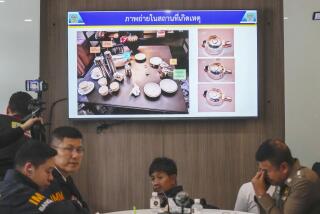Bombings, business and the future of Indonesia
JAKARTA, INDONESIA — For years, James Castle has been Mr. Indonesia, a well-known Western face here promoting the world’s most populous Muslim nation as a sensible international investment destination.
The graying, bespectacled American met with presidents and generals, his CastleAsia consulting firm guiding outside investors with advice about political risk and economic trends.
On Friday, as deadly bombs ripped through two luxury Jakarta hotels, Castle saw firsthand the dark side of doing business in a nation torn by political and religious strife.
His firm was holding its weekly breakfast round table at the JW Marriott when a suicide bomber detonated an explosive device packed with nails, authorities say. The blast killed one New Zealander attending the breakfast and injured several others, including Castle.
No group has taken responsibility for the twin attacks, which killed at least nine people, including two suspected of being the attackers. The investigation is focusing on Noordin Mohammad Top, a bomb maker and leader of a splinter group of the Jemaah Islamiah network, which has links to Al Qaeda.
Experts said Saturday it was unlikely that Castle’s gathering of foreigners was the target of the explosion.
“This was a terrible coincidence,” said Wahyu Muryadi, executive editor of Tempo, a weekly magazine here. “It was a matter of being at the wrong place at the wrong time.”
But others say the attack on the high-rise Marriott and Ritz-Carlton hotels was designed as a warning to foreigners. The Marriott was the target of a car bombing in 2003 that killed 12.
“It’s an iconic landmark that represents American ownership,” said Sidney Jones, a Jakarta-based terrorism expert. “Hitting the Marriott strikes at U.S. business interests.”
On Saturday, much remained unclear about the attack. Investigators think the two suicide bombers stayed at the Marriott and carried in the ingredients of their explosives one piece at a time to avoid detection.
The bombs struck at the height of the busy Friday morning business rush, one day before the Manchester United soccer team was scheduled to check in to the hotel.
Asian terrorism experts said it was unclear whether the attackers figured the arrival of the Western soccer team in their calculations. “If it was Noordin Mohammad Top, he is Western-educated and would have seen the significance of the soccer team’s arrival,” said Maria Ressa, author of “Seeds of Terror,” about the search for Al Qaeda hide-outs.
“If it isn’t him and is the work of some other operatives, perhaps they’re not as in touch with the Western world as we would expect.”
Either way, Jones said, the bombs still hit their target.
“These attacks are not always about the body count,” she said. “These people were successful in grabbing the world’s attention.”
Jones said the sophisticated feat of detonating a pair of bombs within two minutes of each other despite heightened hotel security no doubt took months of planning.
She discounted reports that the bombings were connected to the hundreds of Jemaah Islamiah rebels recently released from custody in Indonesia, Malaysia and Singapore.
“I’m not sure that group contains a likely group of suspects,” she said. “Very few have been directly involved in bombings -- more so peripheral jobs as couriers or hiding fugitives.
“Many former prisoners have been co-opted by police and were not willing to risk the profit of that cooperation. Maybe five or six represented a serious risk of returning to violence, and the authorities had many of those under surveillance.”
Whoever was at fault in the attacks, Muryadi said the result was bad news for Indonesia’s attraction as an investment destination.
“I think foreigners might think twice now about doing business here anymore,” he said. “My reporters have already talked to Australians who couldn’t wait to get out of the country.”
None of that is good news for Castle, who concentrated his energies on demonstrating the positive here.
“He’s one of the main cheerleaders of Indonesia,” Ressa said of Castle, a former American Chamber of Commerce president here who arrived in Indonesia in 1977.
The breakfast round table, a 10-year-old event, was often held at the Marriott, which is near Castle’s home, Muryadi said.
CastleAsia employee Wiwi Wijayanti said the company’s chairman suffered some hearing damage in the blast. Another employee who asked not to be identified said 19 businessmen were at the meeting when the bomb struck.
He said Castle was “recovering from shock” and was being closely monitored by doctors.
Jones said she expected foreign investment to resume here. “There was little impact on the business community following the first Marriott attack in 2003. There will clearly be deep concern and real shock at the fact that some executives were killed in this bombing. But it won’t be a critical factor determining whether investment here grows or declines.”
On Saturday, businessman Sandi Siswantoro held his 2 1/2 -year-old son, Mika, outside the Marriott. He said he was trying to teach the boy a lesson.
“I want to show him the ugly work of terrorism,” he said, “and make the point that this kind of behavior is not good for Indonesia.”
--
More to Read
Sign up for Essential California
The most important California stories and recommendations in your inbox every morning.
You may occasionally receive promotional content from the Los Angeles Times.











